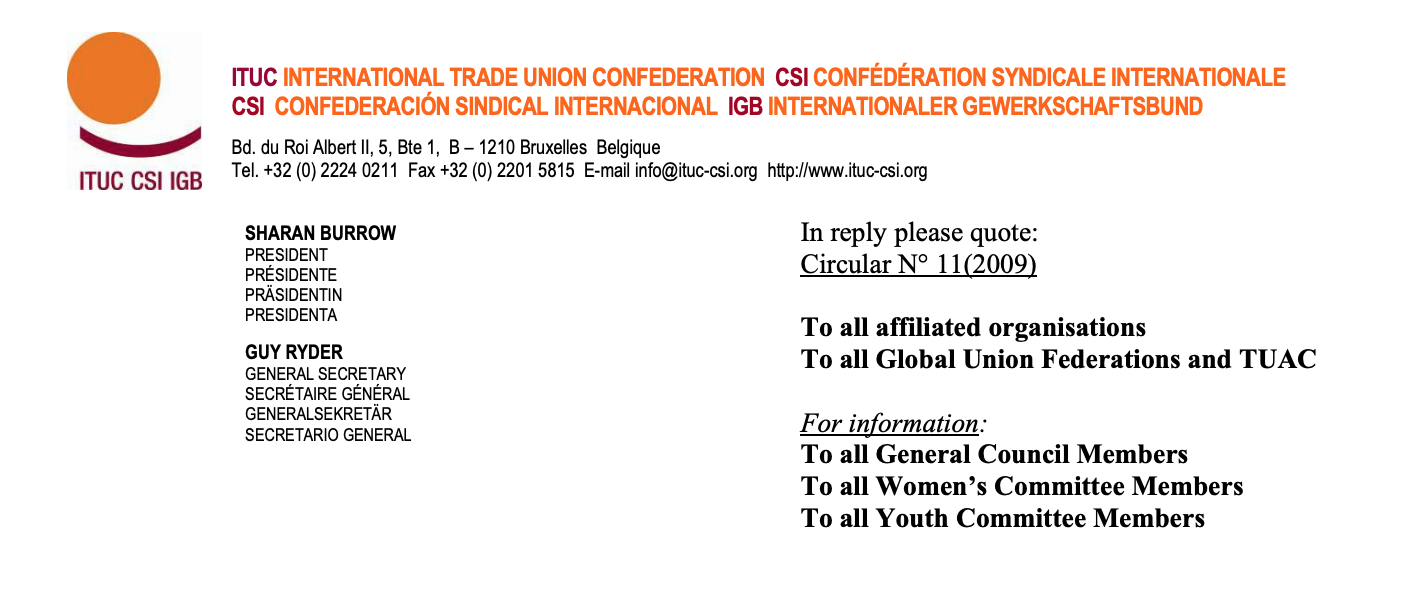
ITUC 28 April Document & Back grounder links:
Circular http://www.ituc-csi.org/IMG/pdf/No_11_-_ICD_AR.pdf
Background: http://www.ituc-csi.org/IMG/pdf/No_11_-_BkgrderICD09-e.pdf
Support Grows for 28 April Campaign to protect Chinese workers from cadmium
A trade union 28 April campaign that began three years ago in China has been vindicated by the UN in its warnings about toxic cadmium exposures to Chinese factory workers. For 28 April, 2008 the ITUC raised the issue of cadmium poisoning with the World Health Organisation (WHO) after which the UN-based Strategic Approach to International Chemicals Management (SAICM) produced a report on the substance for the recent UNEP Environment Ministers meeting in Nairobi The report includes occupational issues related to cadmium-exposed workers, especially in battery manufacturing. As a result the United Nations Environment Programme (UNEP) is now encouraging governments to reduce worker risks and promote the use of cadmium-free alternative products. A similar track for Murcury led to a recent decision to control it through a binding Convention.
Factories poisoning Chinese workers In 2008 a global campaign aimed at a Hong Kong company, Gold Peak Industries, whose factories are poisoning its workers by exposing them to unsafe levels of cadmium was launched by the International Trade Union Confederation (ITUC) and the NGO, Globalization Monitor – GM. Since then, the United Nations Environment Programme (UNEP) has completed a scientific review of the health risks of exposure to cadmium and is encouraging governments to reduce the risk to workers and promote the use of cadmium-free alternative products. Workers at the factories have staged a strike and other actions to force the company to compensate the affected employees and a solidarity action was organized at the company’s headquarters in Hong Kong on April 22.
Gold Peak Industries, a Culprit Gold Peak Industries, the company at the centre of the campaign, is 53.4% owned by Gold Peak (Holdings). It produces and markets batteries, electronic components, cables and other products. In addition to its operations in China and Hong Kong, the company has a manufacturing network that extends into Singapore and Malaysia. Its marketing network reaches Belgium, Denmark, France, Germany, Italy, Philippines, Poland, South Korea, Sweden, Thailand, The Netherlands, Taiwan and U.K. Cadmium-related problems with this group of companies have received wide publicity.
Young Female Workers A number of fatalities have already been reported, as have sixteen cases of confirmed cadmium poisoning, and 400 more reported cases of excessive exposure. An additional 1,000 workers, most of them young females, continue to face short or long-term exposure through their work. Cadmium is produced mainly as a by-product of mining, smelting and refining of zinc and, to a lesser degree, as a by-product of lead and copper production. According to the UNEP scientific review, cadmium is used and traded globally as a metal and as a component in various products. A growing proportion of refined cadmium consumption is accounted for by NiCd batteries, which in 2004 represented 81 percent of the total. Cadmium is not essential for biological function in humans. The kidney is considered the critical target organ for both the general population and occupationally exposed populations. The main route of cadmium exposure in the occupational setting is via the respiratory tract, says the UNEP report. The first description of the health effects of cadmium referred to lung damage after acute inhalation in the 1930s. International warnings of the health risks from cadmium exposure were issued in the 1970s.
Cadmium is a carcinogen Cadmium is a carcinogen by inhalation. Being an element, cadmium is persistent – it cannot be broken down into less toxic substances in the environment. Cadmium bio-accumulates mainly in the kidneys and liver of vertebrates and in aquatic invertebrates and algae. The general trend in global cadmium consumption over the last two decades has been a steep increase in the use of cadmium for batteries and a decrease in the use for nearly all other applications. In 2005, the batteries (NiCd) accounted for about 82 percent of the estimated world consumption. The manufacturing countries for portable NiCd batteries today are China and Japan. The main uses for NiCd batteries today are cordless power tools. In February 2007 two of the largest toy companies, Toys “R” Us Inc, and Mattel Inc. agreed to phase out nickel-cadmium batteries and there is growing international pressure for other companies such as Canon, Casio, Fuji, JVC, Kodak, Konica Minolta, Nikon, Olympus Panasonic, Pentax, Ricoh, Sony and Toshiba to do the same. Workers whose health has been affected at the factories controlled by Gold Peak are asking for the company to pay for regular medical checkups, to test their children for cadmium poisoning, to assign workers with high cadmium levels to new jobs and to pay them a special nutrition fee until their condition improves.
ITUC & GM invite recommendations from the international community about possible courses of action to remedy the situation. Both organizations have issued a call for information relating to the operations of Gold Peak and its three Chinese subsidiaries - Huizhou Power Pack Company Limited (惠州超霸電池有限公司), Huizhou Advance Battery Technology Company (惠州先進電池有限公司) and Shenzhen Jetpower Batteries Limited (深圳捷霸電池有限公司公). At the same time, they have requested additional information on their release of such carcinogenic agents as cadmium, as well as an analysis of their likely impacts.
See also each country mentioned above. For a copy of the Wednesday 21 March, 2007 story also containing information about cadmium dangers and monitoring by companies: [http://www.global-unions.org/pdf/ohsewpQ_9h.EN.pdf].
For a copy of the 28 April Gold Peak Company Profile: [http://www.global-unions.org/pdf/ohsewpQ_9d.EN.pdf .
Please send reports of your 28 April activities to Lucien Royer [[email protected]]
